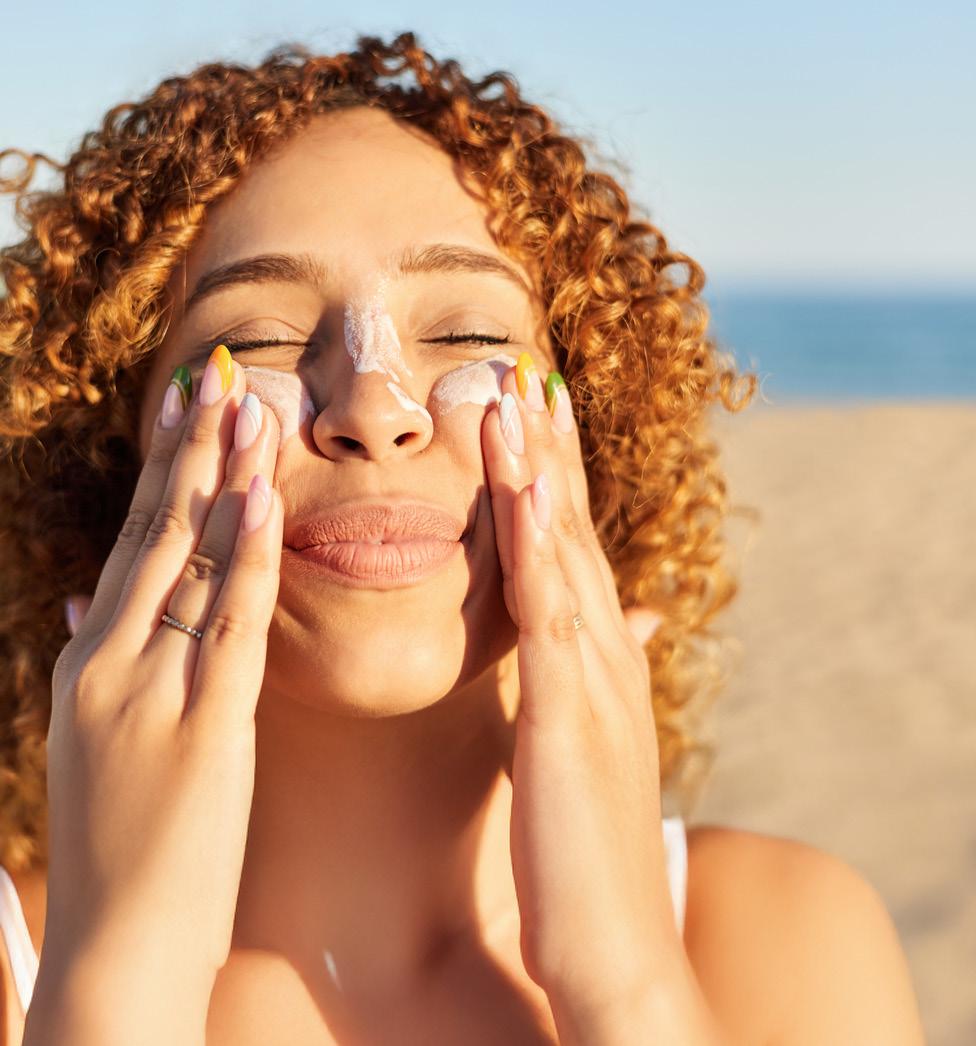
PROTECTING YOUR SKIN MATTERS
MINDFUL WALKING
Plus a look at what’s really making you sick in the warmer months
In this issue of Your Health, we embrace the summer season with tips to boost your wellbeing. Discover the benefits of mindful walking, learn to distinguish between seasonal flu and summer illnesses, and get essential advice on sun awareness and skin health.
Sun Awareness and Skin Health
WHY PROTECTING YOUR SKIN MATTERS
The warm glow of the sun often feels like a welcome companion, but it’s important to remember that it is also threat to our skin health. Sun exposure, while essential for vitamin D production, can have serious consequences if not managed responsibly and can be life-limiting.
SKIN CANCER PREVENTION
Skin cancer is one of the most common types of cancer worldwide, yet it is also one of the most preventable. Prolonged exposure to UV radiation from the sun or tanning beds
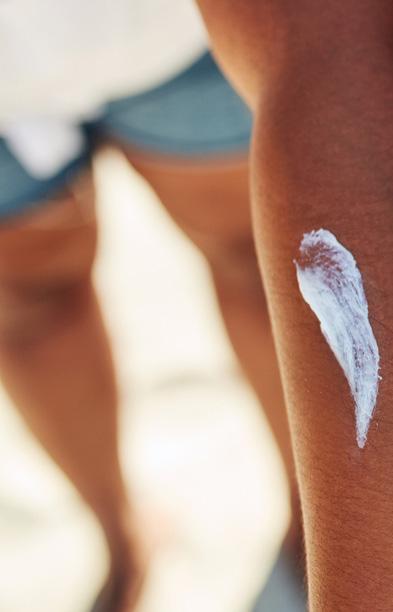
is a major risk factor for developing skin cancer, including melanoma, the deadliest form. UV rays damage the DNA in skin cells, which can lead to uncontrolled cell growth and tumour formation. Practising sun safety can significantly reduce your risk. Using a broad-spectrum sunscreen with SPF 30 or higher, wearing protective clothing and seeking shade during peak hours in the summer (10am to 4pm) are simple yet effective measures. Regular self-checks for unusual moles or skin changes and routine visits to a dermatologist can also aid early detection, which is crucial for successful treatment.

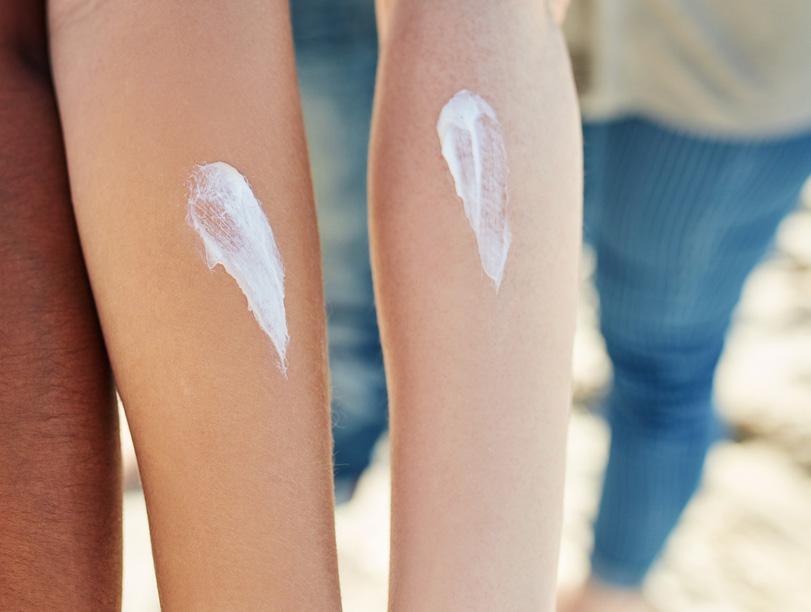
THE SUNSCREEN HABIT
One small habit that can make a huge difference for your skin health is the application of sunscreen. In the UK, the sun’s UV rays are often strong enough to cause damage between mid-March and mid-October. Use a UV index tool to find out how strong the sun’s UV rays are - if it is 3 or above, it’s time to consider sun safety steps. Sunscreen acts as a shield, blocking or absorbing harmful UV rays before they can penetrate the skin and cause damage.
Broad spectrum coverage should be considered for both UVA (which is known to cause photo ageing) and UVB (causing sunburn) in
sunscreen, to maximise protection. For maximum effectiveness, apply generously to all exposed areas of skin and reapply every two hours, especially if swimming or sweating.
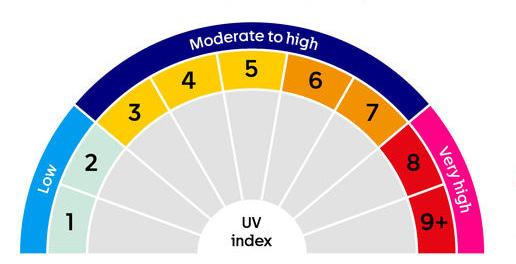

HYPERPIGMENTATION AND SKIN AGEING
Beyond the risk of cancer, sun exposure is a leading cause of hyperpigmentation and premature skin ageing. UV rays stimulate the overproduction of melanin, the pigment responsible for skin colour, which can result in uneven skin tone, dark spots and conditions like melasma. Additionally, UV radiation breaks down collagen and elastin in the skin, leading to wrinkles, sagging and a loss of firmness – hallmarks of photo ageing.
While these effects may seem purely cosmetic, they can have a significant impact on self-esteem and confidence. Daily use of sunscreen, even on cloudy days or during winter, is one of the most effective ways to combat hyperpigmentation and delay the signs of ageing.
COSMETIC SURGERY FOR SUN DAMAGE
As awareness of sun damage grows, so does the demand for cosmetic procedures to reverse its effects. Treatments like chemical peels, laser resurfacing and dermal fillers have become increasingly popular among those seeking to address sun-induced hyperpigmentation, wrinkles and loss of skin elasticity. Although such procedures can provide instantaneous results, this does not negate the need to implement adequate sun protection as part of our daily routine. While modern cosmetic interventions offer remarkable solutions, there are associated costs and risks. These treatments cannot fully restore skin to its original state and cannot undo the deeper DNA damage caused by UV exposure. Developing healthy habits, such as consistent sunscreen use, remains the most effective and affordable approach to maintaining healthy skin.


Sun exposure is a leading cause of hyperpigmentation and premature skin ageing.
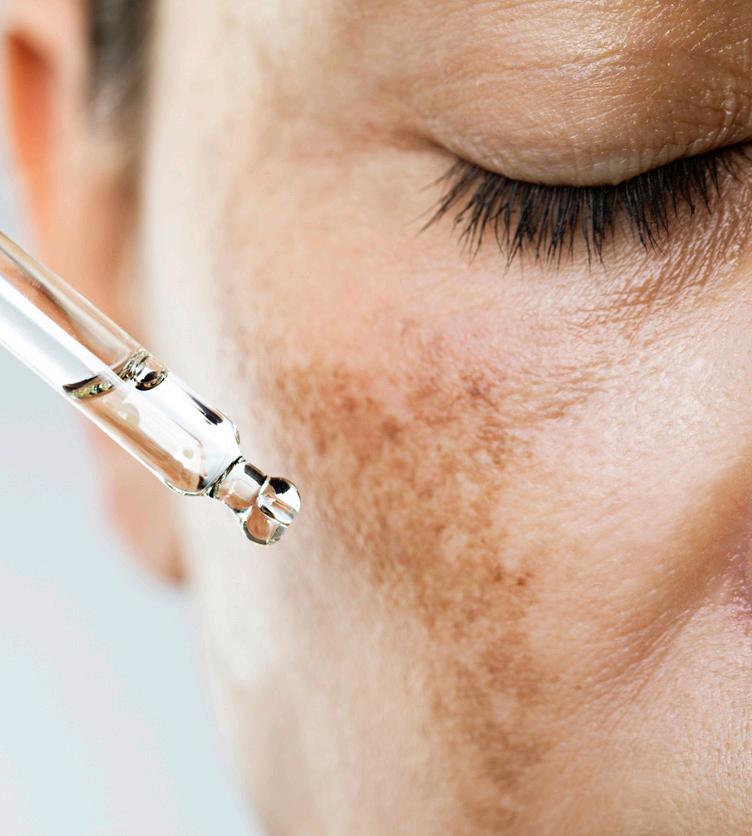

Seasonal Flu vs Summer Illnesses
When it comes to getting sick, we often associate nasal congestion, cough and fever with the colder months of the year. The seasonal flu, after all, thrives in winter, when people tend to gather together indoors. However, illnesses don’t take a summer holiday. While the flu may retreat during the warm months, other culprits emerge to challenge our immune systems, from foodborne illnesses to pesky allergies. So, what’s really making you sick in the summer? Let’s explore some common causes and how to stay healthy.
WHATS THE DIFFERENCE?
The seasonal flu, caused by influenza viruses is transmitted more easily in low humidity and cooler temperatures, as well as with close social contact. It therefore spreads more easily during the colder months and significantly declines in summer. However, just because the flu is less common doesn’t mean you’re in the clear. Summer brings its own set of health challenges that can leave you feeling under the weather. These illnesses may not always mimic the flu but they can still cause fatigue, stomach upset and other unpleasant symptoms.
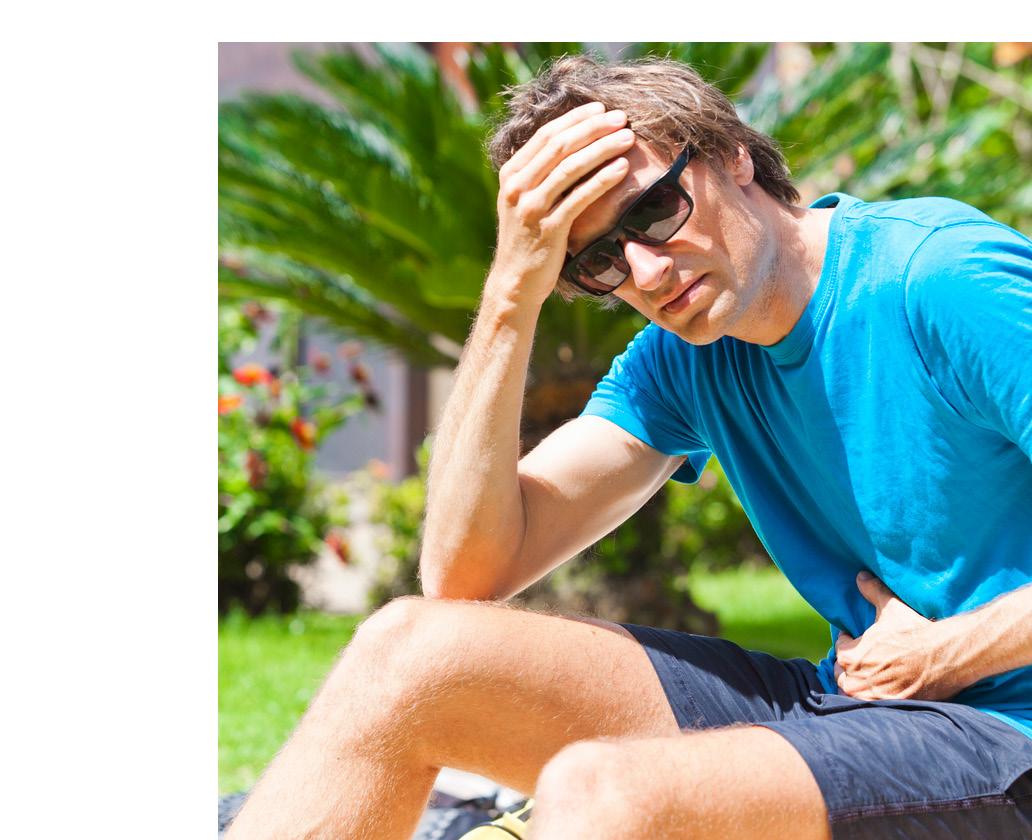
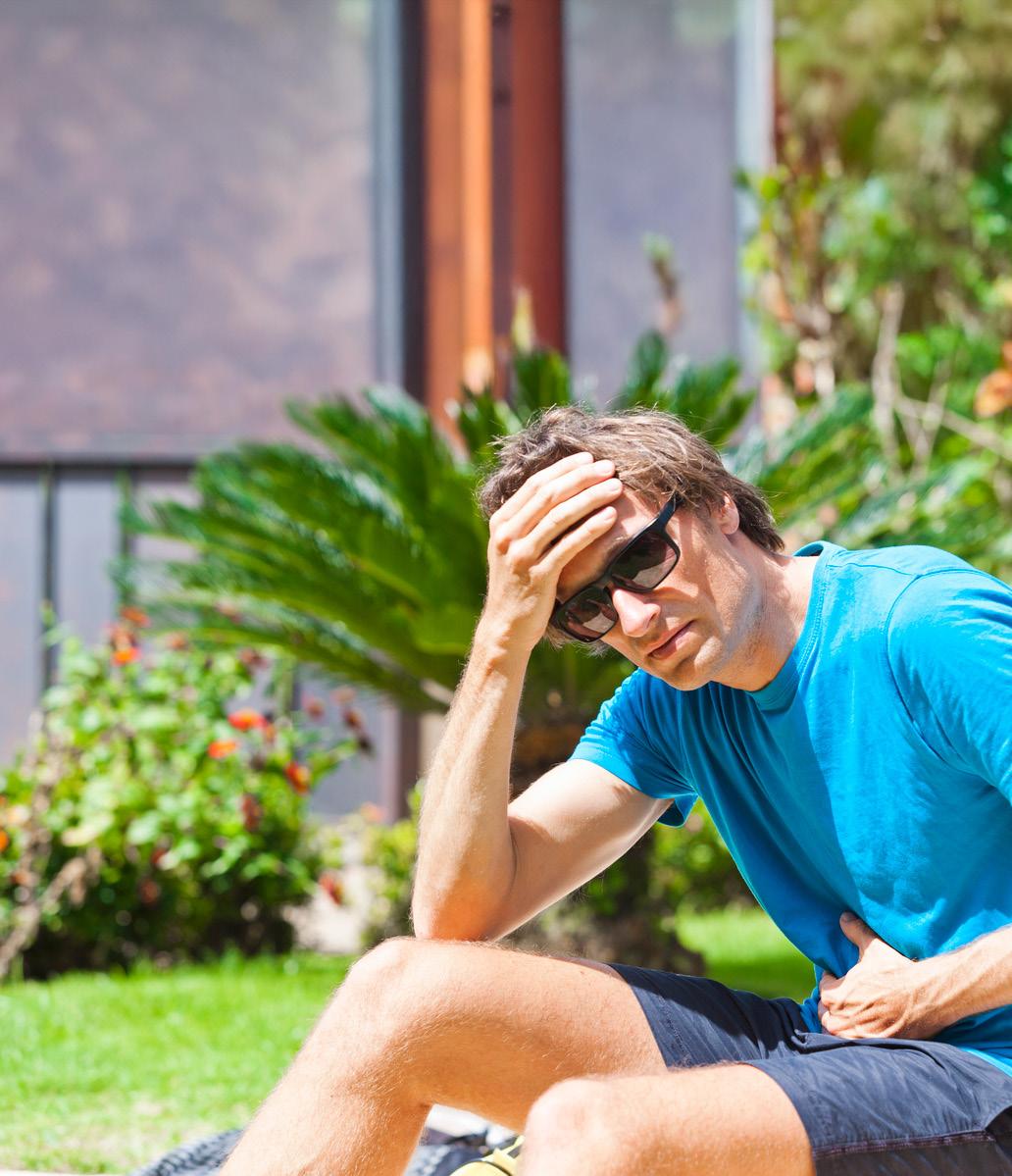

WHAT’S REALLY MAKING YOU SICK IN THE SUMMER?
f Foodborne illnesses
Summer is synonymous with barbecues, picnics and outdoor gatherings, which can be a breeding ground for foodborne illnesses. Bacteria like Salmonella, E. coli and Listeria thrive in warm, moist conditions, and improperly handled or undercooked food can quickly become a health hazard.
Common culprits include undercooked meats, improperly stored mayonnaise-based salads, and unwashed fruits and vegetables. To prevent these issues, it is essential to cook meat to the appropriate internal temperature, store perishable items in a cooler with ice packs, and wash hands and surfaces thoroughly when preparing food, particularly where you have handled raw meat or fish.
f Heat-related illnesses
The sweltering summer heat can lead to dehydration, heat exhaustion and even heatstroke if you’re not careful. Spending long hours outdoors without adequate hydration or shade can quickly take a toll on your body. You can help prevent these hazards by drinking plenty of water, avoiding outdoor activities during peak heat hours and wearing lightweight, breathable clothing.
f Summer allergies
For those prone to allergies, summer can be a challenging time. While spring heralds increasing levels of tree pollen, summer brings its own allergens, such as grass and weed pollen. Additionally, mould spores can increase due to the humid conditions. We advise monitoring pollen counts, keeping windows closed during peak times and considering use of antihistamines or nasal sprays (if compatible with any other medication you are using and provided use is not contraindicated for any pre-existing health conditions).
f Recreational water illnesses
A refreshing dip in a pool, lake or ocean may be a quintessential summer activity, but it is not without its risks. Contaminated water can expose swimmers to bacteria, viruses or parasites, which can lead to a range of illnesses. Common issues include diarrhoea, ear infections and skin rashes, all of which can quickly put a damper on summer fun.
To minimise these risks, it is important to take preventive measures. Avoid swallowing pool or lake water, as this is a common way harmful microorganisms are ingested. Cover any skin breaks with waterproof dressings. Showering both before and after swimming can help reduce the spread of germs, and it is essential to ensure that pools are properly chlorinated and well-maintained to keep waterborne pathogens at bay.
f Insect-borne diseases
Summer is prime time for mosquitoes, ticks and other biting insects, which can quickly turn outdoor adventures into health risks. Ticks can carry serious diseases such as Lyme disease, and there is also a very low risk of the transmission of West Nile Virus from mosquitoes in the UK. Bites can result in skin infections or uncomfortable allergic reactions.
Using insect repellent is a simple yet effective way to deter bites. Wearing long sleeves and trousers can provide an added layer of protection, particularly when spending time in wooded or grassy areas.
Check for ticks after outdoor activities and remove them promptly using proper techniques to lower the risk of tick-borne illnesses. Learn how: lymediseaseaction. org.uk/about-ticks/tick-removal

HOW TO STAY HEALTHY THIS SUMMER
To protect yourself from summer illnesses, taking a proactive approach to your health is essential. Keep the following general tips in mind:
f Stay hydrated: Carry a water bottle with you and drink regularly.
f Practice food safety: Keep hot foods hot and cold foods cold, and discard anything left out at room temperature for more than two hours.
f Protect your skin: Use sunscreen with at least SPF 30, wear sunglasses, and seek shade to prevent sunburn and heat-related illnesses.
f Stay informed: Pay attention to weather and allergy forecasts and plan your activities accordingly.


Embrace the Summer with Every Step

Summer is the perfect time to step outside and reconnect with the world around us. One simple yet transformative way to do this is through mindful walking. This practice encourages us to slow down, breathe deeply and immerse ourselves in the present moment – a welcome antidote to the rush of modern life. Whether you’re strolling along the beach, wandering through woodlands or simply walking to the local park, mindful walking allows you to embrace the outdoors while boosting both your mental and physical health.
WHAT IS MINDFUL WALKING?
A normal walk often involves moving from one place to another with little thought given to the act of walking itself. Our minds may be preoccupied with plans, worries or distractions, meaning we rarely pay attention to our surroundings or the sensations in our bodies. In contrast, mindful walking is an intentional practice of being fully present in the moment as you walk. Instead of letting your mind wander to to-do lists or worries, you focus on your body, your surroundings and the rhythm of your steps. It’s not about reaching a destination but about appreciating the journey itself. By engaging your senses and grounding yourself in the present, mindful walking can reduce stress, improve focus and cultivate a sense of gratitude.

PREPARING FOR YOUR MINDFUL SUMMER STROLL
Before heading out, take a moment to prepare for your walk. Choose a location that inspires you – it could be a nearby park, a coastal path or a quiet country lane. Wear comfortable clothing and sturdy footwear, and of course, don’t forget your sunscreen and a reusable water bottle for those warm summer days.
If possible, leave your phone behind or put it on silent to minimise distractions. This is your time to disconnect from technology and reconnect with nature.
Here are some simple steps to guide you on your mindful walking journey this summer:
f Start with a pause: Before you take your first step, stand still for a moment. Close your eyes, take a few deep breaths and feel the warmth of the sun on your skin. Notice the sounds around you – birdsong, rustling leaves or perhaps the hum of a busy city.
f Tune into your body: As you begin walking, pay attention to your body. Feel the ground beneath your feet, the movement of your legs and the gentle sway of your arms. Notice the rhythm of your steps and the way your breath flows naturally in time with your movements.
f Engage your senses: Take in your surroundings, such as the colours of blooming flowers, the scent of freshly cut grass or the warm air, allowing them to pull you into the present moment.
f Let thoughts drift away: It’s normal for your mind to wander, but when it does, gently bring your focus back to your walk. Acknowledge your thoughts without judgement and return your attention to your breath or the sensation of your steps.
f Express gratitude: As you walk, practice gratitude for the environment around you and the simple joy of being outdoors. Gratitude can transform even an ordinary stroll into a deeply uplifting experience.


Take in your surroundings, such as the colours of blooming flowers, the scent of freshly cut grass or the warm air, allowing them to pull you into the present moment.

THE LASTING BENEFITS OF MINDFUL WALKING
Incorporating mindful walking into your routine offers a wide range of lasting benefits for both your mental and physical wellbeing.
On a mental level, it serves as a powerful tool for reducing stress and anxiety, helping you to clear your mind and find calm amidst the busyness of daily life. By focusing on the present moment, mindful walking can improve your concentration and mental clarity, making it easier to tackle challenges with a fresh perspective. It also fosters a sense of gratitude and connection with the world around you, enhancing your overall mood and emotional resilience.
Physically, mindful walking encourages gentle, low-impact movement that supports cardiovascular health, improves circulation and strengthens muscles without being overly strenuous. It can also help regulate your breathing, which promotes relaxation and boosts energy levels. Engaging your senses and becoming more aware of your body during mindful walking can improve your posture and balance over time, while the practice of slowing down and appreciating each step can help combat feelings of fatigue or burnout.
Additionally, mindful walking encourages a deeper connection to nature, which has its own well-documented benefits. There is evidence supporting association with reduced blood pressure, improved immune function and increased feelings of happiness.
Whether you’re walking for five minutes or an hour, the practice can create a ripple effect, leaving you feeling more grounded, energised and better equipped to navigate the demands of daily life.

RESOURCES
f The UV index and sunburn risk | Cancer Research UK
f Sun safety | Reduce your skin cancer risk | Cancer Research UK
f Sunscreen and sun safety - NHS
f Summertime Sickness: Common Illnesses This Season
f Why Am I Getting Flu Symptoms In The Summer | Midland Health
f Tick Removal | Lyme Disease Action
f Mindful Walking & Walking Meditation: A Restorative Practice
f Practise this guided mindful walking meditation outdoors | Bupa


NEXT ISSUE:
f Menstruation & Pregnancy
f Stretching for Health
At Health Partners we offer a full range of tailored health and wellbeing services.
Our thinking is innovative. We constantly develop new responses and tools designed to address the health and wellbeing challenges that face your business and people.
Our commitment is total. We invest in our services, creating new ones and keeping in step with every client. We constantly explore new ways of working and make no compromises in the quality of our services.
Simply put, we are here to help people be their best.
